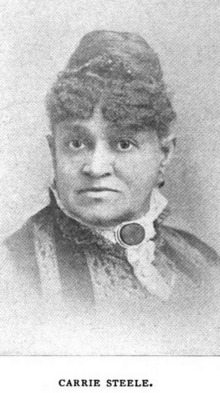Carrie Steele Logan
Carrie Steele Logan (born about 1829 – November 3, 1900)[1] was an American philanthropist, founder of the oldest black orphanage in the United States.

Early life
Carrie Steele was born into slavery in Georgia in about 1829. She was orphaned as a small child.[2]
Career
Steele sold handmade candies and cakes when she first moved to Atlanta; later she found work as a matron at the train depot in Atlanta. Working there, she saw many displaced children, homeless and without adults to care for them. She started looking after some of the orphans herself, but soon realized a larger, more sustainable response was needed.[3] "It is appointed to me in my old age to accomplish what I believe to be a great and glorious work," she wrote, "and one that shall live long after my poor frail body has dropped into the dust whence it came."[4] With her own money, a charter from the state of Georgia, and donations from the city's growing black middle class, she opened an orphanage for black children in Atlanta in 1889.[5] It is considered the oldest such institution in the United States.[2]
By 1892, the orphanage had a new three-story building, to house and educate up to fifty children. Steele wrote an autobiography, which she sold to raise funds for the orphanage.[6]
Personal life and legacy
In 1843, Carrie Steele had a son, James Robert Steele, who was a barber; they moved to Atlanta together after Emancipation. She married Josiah Logan, a minister, in 1890. She died in November 1900, aged 71 years, and her memorial service was "One of the largest funerals I have ever seen," according to H. R. Butler, an eyewitness, who counted at least 3000 attendees. "All the orphan children were out. Nearly every minister in the city was present."[7] Her gravestone in Atlanta's Historic Oakland Cemetery is inscribed "Mother of Orphans/She hath done what she could."[8]
Steele's orphanage is still in operation, now named the Carrie Steele-Pitts Home, on a large campus outside the city. In 1998, Carrie Steele Logan was named as a Georgia Woman of Achievement.[6] There is a bronze bas relief sculpture of Logan on Auburn Avenue in Atlanta.[9]
References
- "Carrie Steele Logan". Find A Grave.
- "The Founder of the Carrie Steele-Pitts Home", Carrie Steele-Pitts Home website.
- Edward R. Carter, The Black Side: A Partial History of the Business, Religious and Educational Side of the Negro in Atlanta, Ga. (1894): 35-37.
- Minnie L. Perry, "The Carrie Steele Orphanage of Atlanta, Ga." in W. E. B. DuBois, ed., Some Efforts of American Negroes for Their Own Social Betterment (Atlanta University 1898): 60-61.
- Allison Dorsey, To Build Our Lives Together: Community Formation in Black Atlanta, 1875-1906 (University of Georgia Press 2004): 52. ISBN 9780820326191
- Tevi Taliaferro Henson, "Carrie Steele Logan" New Georgia Encyclopedia (2004).
- "What The Negro is Doing" Atlanta Constitution (November 11, 1900): A4. via ProQuest
- Tevi Taliaferro, Historic Oakland Cemetery (Arcadia Publishing 2001). ISBN 9781439612118
- Brian Owens, "Auburn Avenue Bas Relief: Carrie Steele Logan" Atlanta Plan-it.
External links
- Carrie Steele Logan's gravesite on Find a Grave.